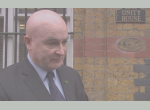TRAIN DRIVER Alex Gordon has been elected to serve as the President of RMT, Britain’s biggest specialist transport union, for the coming three years.
In the postal ballot that closed today Bristol-based Alex, who will take up office in January, beat four other candidates and replaces John Leach, a London Underground worker whose term of office ends at the close of the year.
RMT’s President is the most senior lay official in the union, whose responsibility is to uphold the union’s rulebook and to preside over meetings of the union’s executive bodies, including the sovereign annual general meeting.
“Alex Gordon is a highly respected RMT activist who has served his union at all levels, from the all-important local rep to the union’s executive, and I know he will make an excellent President,” RMT general secretary Bob Crow said today.
- Press releases on this site are taken from www.rmt.org.uk.
- 11210 reads
> RMT National News
- ‹ previous
- 6 of 12
- next ›





